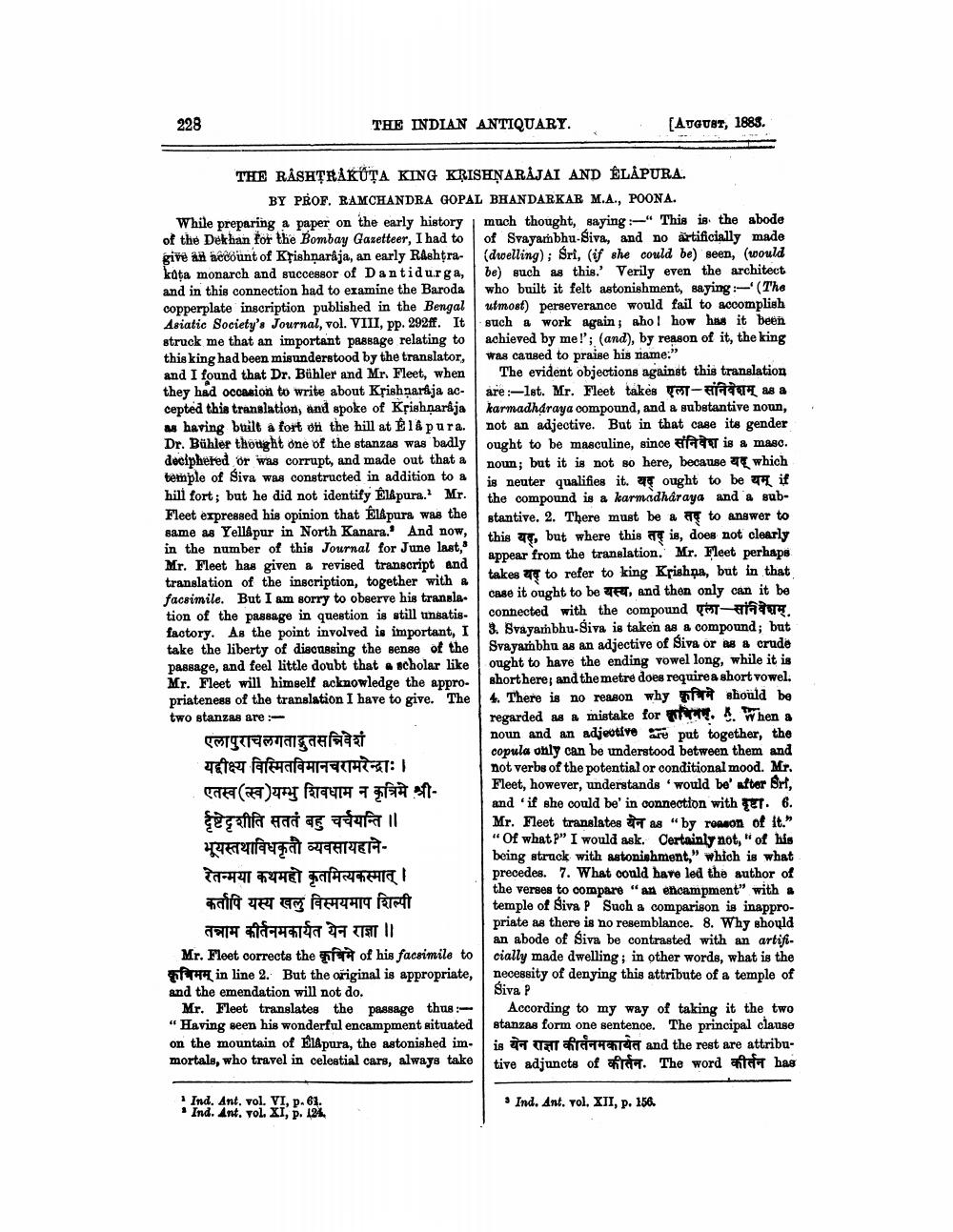________________
228
THE INDIAN ANTIQUARY.
THE RASHTRAKOTA KING KRISHNARAJAI AND
LAPURA.
BY PROF. RAMCHANDRA GOPAL BHANDARKAR M.A., POONA.
While preparing a paper on the early history of the Dekhan for the Bombay Gazetteer, I had to give an account of Krishnaraja, an early Rashtra kata monarch and successor of Dantidurga, and in this connection had to examine the Baroda copperplate inscription published in the Bengal Asiatic Society's Journal, vol. VIII, pp. 292ff. It struck me that an important passage relating to this king had been misunderstood by the translator, and I found that Dr. Bühler and Mr. Fleet, when they had occasion to write about Krishnaraja accepted this translation, and spoke of Krishnaraja as having built a fort on the hill at El&pura. Dr. Bühler thought one of the stanzas was badly deciphered or was corrupt, and made out that a temple of Siva was constructed in addition to a hill fort; but he did not identify Êlapura.' Mr. Fleet expressed his opinion that Elapura was the same as Yellapur in North Kanara. And now, in the number of this Journal for June last," Mr. Fleet has given a revised transcript and translation of the inscription, together with a facsimile. But I am sorry to observe his transla. tion of the passage in question is still unsatisfactory. As the point involved is important, I take the liberty of discussing the sense of the passage, and feel little doubt that a scholar like Mr. Fleet will himself acknowledge the appropriateness of the translation I have to give. The
two stanzas are:
एलापुराचलगताद्भुतसन्निवेशं
यद्वीक्ष्य विस्मितविमानचरामरेन्द्राः । एतस्व (स्वयम्भु शिवधाम न कृत्रिमे श्रीदृष्टेदृशीति सततं बहु चर्चयन्ति ॥ भूयस्तथाविधकृती व्यवसायहानेरेतन्मया कथमहो कृतमित्यकस्मात् । softver agregar faeft तन्नाम कीर्तनमकार्यत येन राज्ञा ॥ Mr. Fleet corrects the f of his facsimile to
4 in line 2. But the original is appropriate, and the emendation will not do.
Mr. Fleet translates the passage thus:"Having seen his wonderful encampment situated on the mountain of Elapura, the astonished immortals, who travel in celestial cars, always take
Ind. Ant. vol. VI, p. 61. Ind. Ant. vol. XI, p. 124.
[AUGUST, 1883.
much thought, saying:-" This is the abode of Svayambhu-Siva, and no artificially made (dwelling); Sri, (if she could be) seen, (would be) such as this.' Verily even the architect who built it felt astonishment, saying:-' (The utmost) perseverance would fail to accomplish such a work again; aho! how has it been achieved by me!'; (and), by reason of it, the king was caused to praise his name:"
The evident objections against this translation are:-1st. Mr. Fleet takes - as a karmadharaya compound, and a substantive noun, not an adjective. But in that case its gender ought to be masculine, since is a masc. noun; but it is not so here, because which is neuter qualifies it. यद् ought to be यम् if the compound is a karmadhâraya and a substantive. 2. There must be a to answer to this, but where this is, does not clearly appear from the translation. Mr. Fleet perhaps takes to refer to king Krishna, but in that case it ought to be , and then only can it be connected with the compound एला - सनिवेशम् 3. Svayambhu-Siva is taken as a compound; but Svayambhu as an adjective of Siva or as a crude ought to have the ending vowel long, while it is short here; and the metre does require a short vowel. 4. There is no reason why should be regarded as a mistake for . . When a noun and an adjective are put together, the copula only can be understood between them and not verbs of the potential or conditional mood. Mr. Fleet, however, understands would be' after Sri, and if she could be' in connection with T. 6. Mr. Fleet translates as "by reason of it." "Of what?" I would ask. Certainly not, "of his being struck with astonishment," which is what precedes. 7. What could have led the author of the verses to compare "an encampment" with a temple of Siva ? Such a comparison is inappropriate as there is no resemblance. 8. Why should an abode of Siva be contrasted with an artifi cially made dwelling; in other words, what is the necessity of denying this attribute of a temple of Siva P
According to my way of taking it the two stanzas form one sentence. The principal clause is येन राज्ञा कीर्तनमकार्यत and the rest are attribu tive adjuncts of कीर्तन. The word कीर्तन has
Ind. Ant. vol. XII, p. 156.




